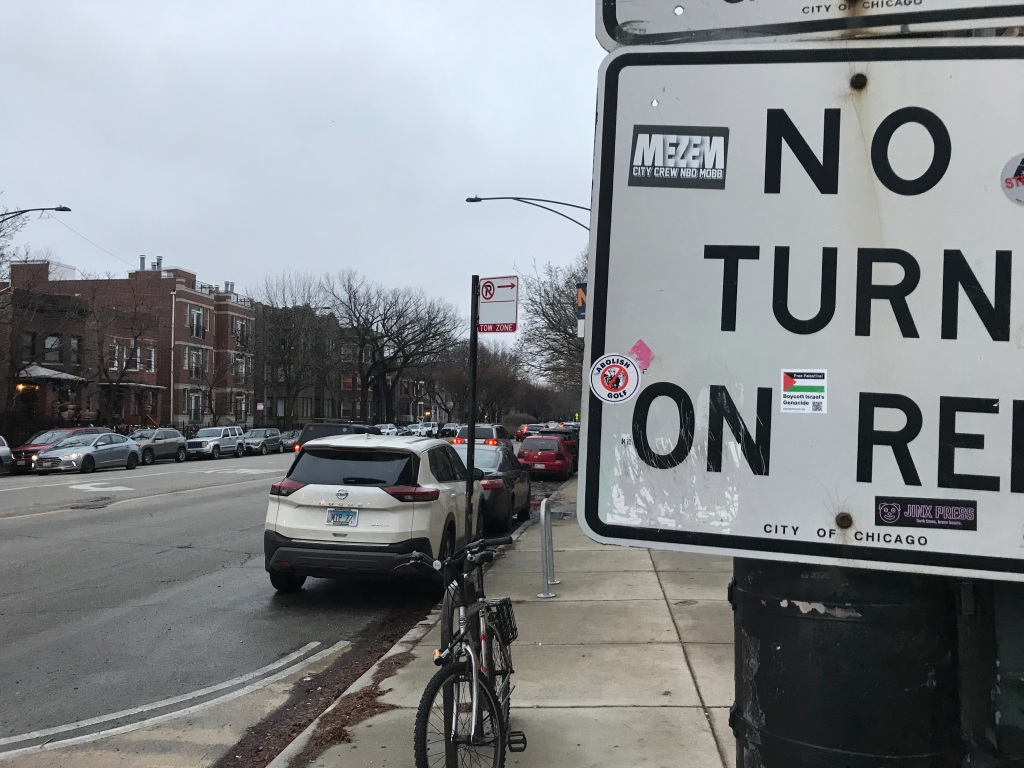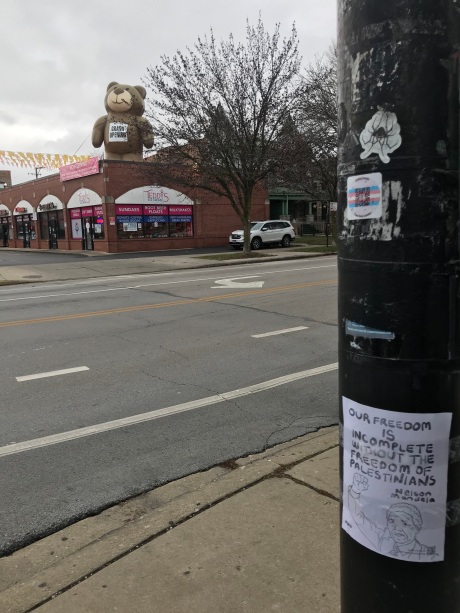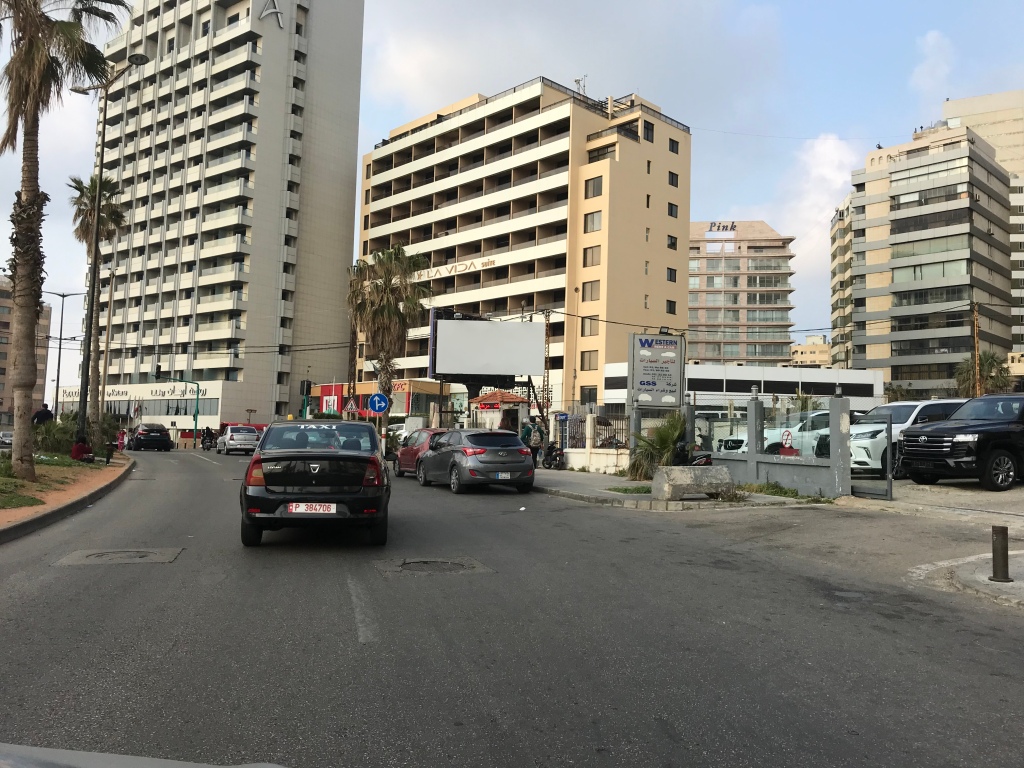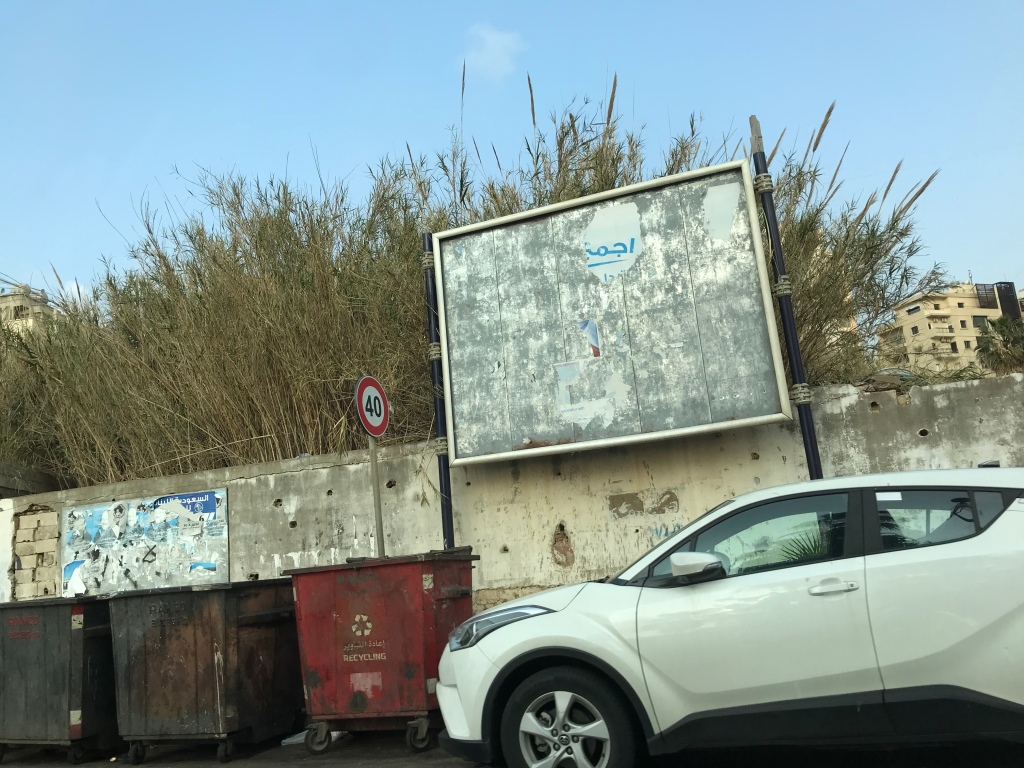




Chicago street-level support of Palestine, mostly North Center and adjacent community areas.

What one sees when stuck in traffic. Seen on the road from Jisr al-Wati to Madhaf: I was instructed by my incredulous spouse to capture the image. It apparently translates as “do not be envious my dear because religion is dripping from my butt.” Requests to have this explained have met with mixed success: all agree it is not proper to mix religion with posteriors, but whether the sense is that the speaker is so overflowing with religion that it leaks from every orifice (my cup runneth over [Psalms:23:5]?), that spirituality is akin to bodily waste, or something else is a mystery. Some were confused, some were shocked, some said there is a culture of drivers with outrageous statements on their vehicles, and some said it would not be safe to drive with that in some areas. What there might be to elicit envy was unclear.
Update: Despite passing unnoticed by my most knowledgeable Arabic speaker, someone who translates books, another explained that without the vowel marks (as Arabic is usually written without them), the word “religion” is a homograph of “debt,” and the statement makes sense: it is about the expensive vehicle, though it is not clear whether the shocking play on words is intentional. A blasphemous meaning is only in the mind of the reader?


The economic collapse has sometimes subtle manifestations. Very recently while enjoying the relatively free-flowing, markedly reduced vehicular traffic about town, something I will greatly miss should fuel become inexpensive again, I noticed blank billboards. Back during the boom times/the glory days/the wonder years/the golden age, the sides of the road were super-saturated with billboards unto absurdity. After seeing over one hundred billboards for mortadella in a few minutes, I would have been willing to eat some just to not see the same image again and again on the autostrat (what I hear it called, though I do not know from which language it originates). The first was taken in Raouché, and the second nearby.

I saw this poster and thought of Beirut. Not so much is different, though I would change the rankings and add a few more than remove: in Beirut, the weather is fine (though people complain when it is not perfect), yes about “Dibs” (saving a parking spot that is legally public), potholes (though low priority), cars in the form of traffic, not bikes but scooters, beggars not bums, not rats (and we mostly like the many cats), the mess of dogs yes, not Cubs’s fans (not sure what the equivalent would be: riots, honk parades, politicians?), and trash absolutely, especially when it is not collected. Crime would not be worth listing, rather noise, corruption, banks, inflation, power cuts, banks, shortages of fuel, medicine, and bread, bureaucrats, banks, conspiracy theories, beggars, car bombs, banks, other’s sectarian parties, foreigners of “insert-your-most-hated-country-here,” and banks and politicians and banks again. But we love it.
Apologies to Johnny Sampson (I did buy some postcards)
We moved into our current apartment a year and a month ago, and that is prompting reflection on how much has changed, or more accurately, how astonished we are by how much has changed. A year ago, we were in Tokyo, enjoying the beautiful ume blossoms, blessedly ignorant of the future. A year ago, the financial crisis and economic crisis were unimaginable, and even to the extent the debt crisis was identified, it was over the horizon (we are so used to political crises that they are never unexpected). Anyone predicting the thawra (revolution) of 17 October would have dismissed as a kook. The betting odds on the current ministers being appointed would have been astronomical, had anyone been willing to put any money down. Covid-19 and the ensuing global economic collapse was as realistic a scenario as the zombie apocalypse.
Living in an urban neighborhood comes with noise, far more than the back corner of campus, even accounting for nightly cat fights, and I worried that the noise of cars on our street would bother me mightily. Luckily, it is a one-way street uphill, and the screech of worn brake pads of scooters is rare. Honking by cars is quite common, and when the traffic stalls, which it does frequently, they honk as a mob.
The daily school pick-up is the most regular cause of traffic, though this week the Minister of Heath decreed all schools and universities cancel classes, and thus little morning drop-off and afternoon pick-up traffic exists. A less frequent, unpredictable, yet more dramatic source of traffic back-ups is when someone, presumably a different person each time, parks just below us where the road bends without noticing that when there is a car parked across the street, the road becomes too narrow for large vehicles, especially cement trucks, to pass. Commercial drivers exhibit great patience (I have never witnessed bull-dozing) and proportionally loud horns. Honking, even very loudly, in and of itself is usually insufficient to blast a path, but sooner or later it manages to attract the attention of someone, often a driver of a car stuck behind, to arrive and examine the car. With no small effort, someone manages to call someone, the wayward parker arrives, the car unblocks the road, the frustrated scooters finally break through, and the long line of honking cars quiets and flows away. Even more regular than the school pick-up (which to be fair, is populated by professional drivers and is normally free of honking), is the garbage collection. There is a dumpster station 50 meters or so further along the street, and the trucks come several times a day (and the Syrian garbage-pickers/recyclers even more frequently), most notably at 7 and 11 in the evening. They block the road for 15 to 20 minutes, traffic backs up, and cars start to honk in what could pass for cacophony auditions or a automotive courtship ritual.
Several surprising aspects have come to light: 1) the honking never bothers me; 2) it must be different people every night because they do not seem to realize what is blocking the road and honking is ineffective; 3) the garbage men (they are always men) could manage without blocking the road, but it would take a bit more time and effort; 4) the nightly honkfest (I do not call it a honk-parade because that refers to the moving political rallies with sound systems) has been rare since 17 October, occurring less than once a week, presumably because few go out socializing anymore; 5) Friday, hearing the garbage men and no honking, I looked out expecting to see a disturbing absence of Friday-night traffic, yet saw a most surreal scene: a long line of cars that were patiently waiting without honking.
My only conclusion is that we are all so stunned by crises piled on crises that we sit stupefied and unable to muster sufficient will to act productively. Or, now that no one goes out, the only drivers are locals returning home and patiently well aware of the jam’s cause.
Now try to imagine what it will be like in one year thinking back to now (P. K. Dick, Now Wait for Last Year). Will we look back on today as a time of needless worry, a time of calm before the storm, or as a time so removed by subsequent change as to seem remote and meaningless?
For the clueless or foreign (they go together), cogent tips on proper train etiquette. The only ones I have not observed (or committed) are playing on the tracks, loud headphones, forgetting possessions, and drunkenness (in Japan, at least, which reminds me of another story about Tijuana and San Diego for another time).
This silly blue man features in several advertisements promoting a product (or service) unknown to me. In the video versions, he looks the same and beseeches non-blue people. It is a bit odd to not know what is being advertised. I suspect it has something to do with communications. This was a poster on the Chuo line JR. Although people pigmented blue are associated with woad (Isaris tinctoria) and Picts and other ancient indigenous peoples of the north of the British Isles, this man has a tonsure reminiscent of the Amazon. I could not help but imagine someone finding offense, and the phrase “Woe unto me” Job 10:15, came to mind.